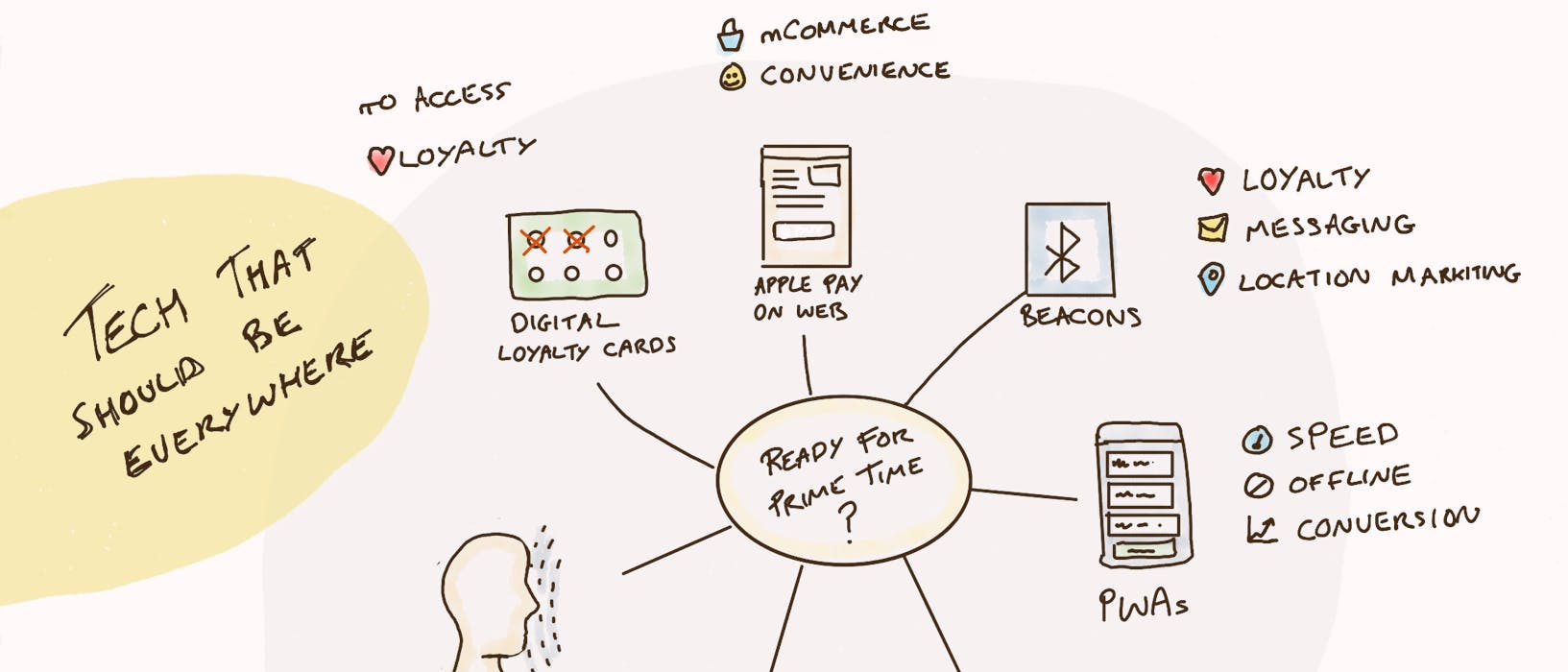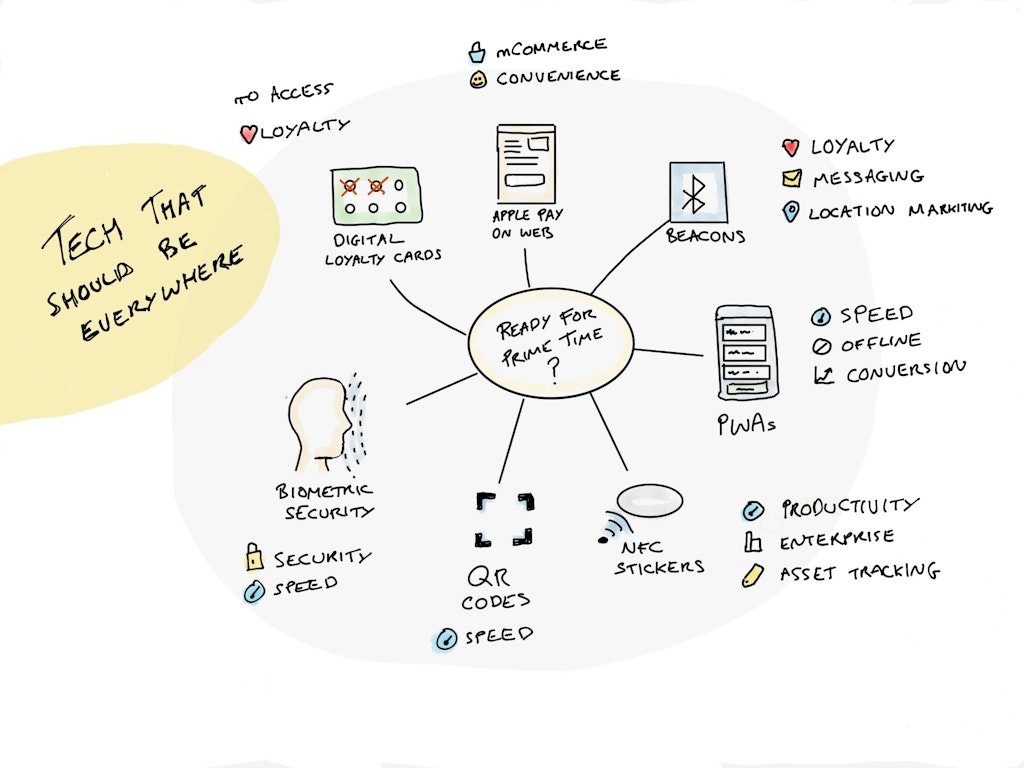By Tobin Harris
Managing Director, Pocketworks
January 15, 2020
Updated September 13, 2022
Planning Your App
Mobile tech that should be more popular by now (2021 update)



UPDATED APRIL 2021
Rather than predicting what’s hot this year, I thought it would be good to look at things from a different angle - what mobile tech is on the rise but hasn’t quite entered the mainstream yet? Hopefully, you’ll see something that could inspire your future roadmap. Something that might improve your customer experience or employee efficiency.

Native Mobile Apps (new!)
Bear with me on this one :)
We conducted some research recently to understand why retailers aren't building apps. Interestingly, many have tried and failed. Many companies believe that their future lies in web technologies, and there is little point in duplicating the online experience in a native app. I'd generally agree with this (give or take a few scenarios).
However, I've seen a few cases this year where a market-leading company has had another crack at creating a mobile app. But instead of duplicating their online experience, they start with the question "how can we make life better for our customers?". So they start researching customer needs and then realise that there are ways they can help - and some of those ideas might be best implemented as an app.
One recent example of this is Travis Perkins, a builders merchant who created an app to make lives easier for the trades. It's had over 4,000 downloads in the first few weeks. That sent ripples through the industry.
TL;DR - just because apps aren't the right technology for everything, start researching your customers and finding opportunities. Apps might not be right for those either, but there is a good chance the technology has a place in your world.
Beacons
Beacons are little gadgets that make it possible for an app to know when you’re near something. Here’s one fabricated use case that they would allow for.
Let’s say you’re walking toward the checkout at Asda. As you approach, the Asda app on your phone detects that you’re near the checkout. So, it and automatically sends you a notification with a discount voucher. This handy reminder means you save some money and have an improved shopping experience, meaning you’re more likely to come back and even tell your friends about it.
Beacons are a way to use location-sensitive triggers to drive loyalty. I think we should be seeing more retailers and hospitality businesses using beacons to create better customer experiences.
Learn more about Beacons on our Mobile Technology Radar.
Apple Pay and Google Pay on websites
Paying for things on web pages is annoying when you have to enter card details. It’s worse when you’re on the move using your mobile phone. Apple Pay and Google Pay can make this a one-tap affair, which is much more convenient for customers.
Web-enabled mobile wallets are perfect for quick transactions like boarding passes, train tickets, cinema tickets and food orders. In my view, anyone who sells a ticket online should be using Apple Pay or Google Pay. Yes, I’m pointing a finger at you, Odeon Cinemas!
Apple Pay and Google Pay for apps
This is the same as above, but for apps. Customers should be able to place orders through an app without having to enter a credit card. Mobile wallets are quicker and more convenient for customers.
Digital Loyalty Cards and Key Cards
Why do coffee shops still give us paper stamp cards? Why do hotels still give out physical key cards? All this could be done through mobile wallets that are already on everyone’s phone (Apple Wallet and Google Pay). Retailers and hotels need to start experimenting with these technologies.
Biometric scanning
This is basically an app scanning your face or fingerprint to allow access. The banks are using it because it’s highly secure and much more convenient than entering a passcode. So why don’t more app publishers use it? It’s better for customers. There are no excuses 🙂
Web Notifications
Ever received a web push notification on your Android device? No? We haven’t either. We have no idea why companies aren’t using web push more. It means you can send notifications to people who visit your website whilst they’re on the move.
Neil Patel, a well known online marketer, is a big fan. He believes that alerting users to new content can bring a lot of people back, and a good percentage of those end up winding their way down your sales funnel. It's one of his top tips for generating additional sales in 2021.
Progressive Web Apps
PWAs are basically web sites that give a more app-like experience. You can receive push notifications. They can work offline. And they can be added to your home screen. PWA’s have higher retention and conversion rates than regular websites. Starbucks and Uber are experimenting with them. Should more businesses be doing this to improve their mobile user experience?
In 2021 we've noticed that a lot of retailers are pushing their online channel due to the lower footfall due to COVID-19. Investing in the website is certainly at the top of their list. Boots is one example of a company that has done this recently. They had a huge job on their hands to switch to more modern web technologies, but it was a necessary step to improving their customer experience.
QR Codes
QR codes are great because, in many situations, they stop people from having to type. Typing is annoying, especially whilst you’re on a phone. As an example, did you know you can create a QR code that allows guests to connect to your WiFi without typing anything? They just scan it and they are instantly on your WiFi network. Cool for coffee shops, huh?
Now that most smartphones detect QR codes just by waving the phone camera at them, consumer’s are catching on slowly. It’s up to you, the business owner, to put more QR codes out there to save people time.
As you may have guessed, this technology is becoming more commonly known in the household due to COVID-19. People are getting used to scanning QR codes to check in with their NHS Covid app. If you're thinking of using QR codes, you should certainly see more uptake from consumers now as they've had to learn how to scan them.
NFC Tags & Stickers
When was the last time you scanned an NFC sticker or tag with your phone? Probably never. Like QR codes, these are great tools for stopping people from having to type. They’re very relevant in a workforce/enterprise setting. You can use them for audits, asset management or fleet.
In the public domain, these are a more expensive version of a QR code. However, a lot more information can be stored on an NFC chip which makes them a good fit for situations where a good network connection is not available.
Flutter (new!)
Flutter is gaining traction nicely, although it's still an emerging technology IMO. What is it? Well, it's basically a set of tools that Google created for developers, to help them build mobile apps. Learn more about it in our "What is Flutter" article. And, there's also a mention on our Mobile Technology Radar.
It has two stand-out features that get CTOs excited.
- It can be used to build phone apps, laptop apps (Windows, Linux, Mac), web apps, embedded device apps
- It doesn't rely on web technologies, so it's fast and smooth, giving a great user experience.
It will be interesting to see how the uptake grows, I think 2021 could be a big year for Flutter.
Here's the Google Trend for Flutter vs React Native, another popular mobile development technology.
Pause and Resume
People using apps get interrupted. So they might be typing a LinkedIn post on their phone and then get pulled away. When they finally return to the app to finish what they were doing, the app should let them resume exactly from where they were before they were interrupted. Many don’t do this and annoyingly make you start again. We hate having to redo the work we’ve already done. There is specific software tech that solves this problem. Every app publisher should use it.
Making apps that make a difference
In case you're wondering, Pocketworks is a software consultancy that specialises in mobile apps.
We bring you expertise in user research, mobile technology and app growth tactics to help you develop apps that create positive impact for your customers, shareholders and society.
To get a flavour of us, check out our free guides and app development services. Or, see some more background info on us.
Wish you had found this earlier?
Enter your email below and get notified when we release new content.
